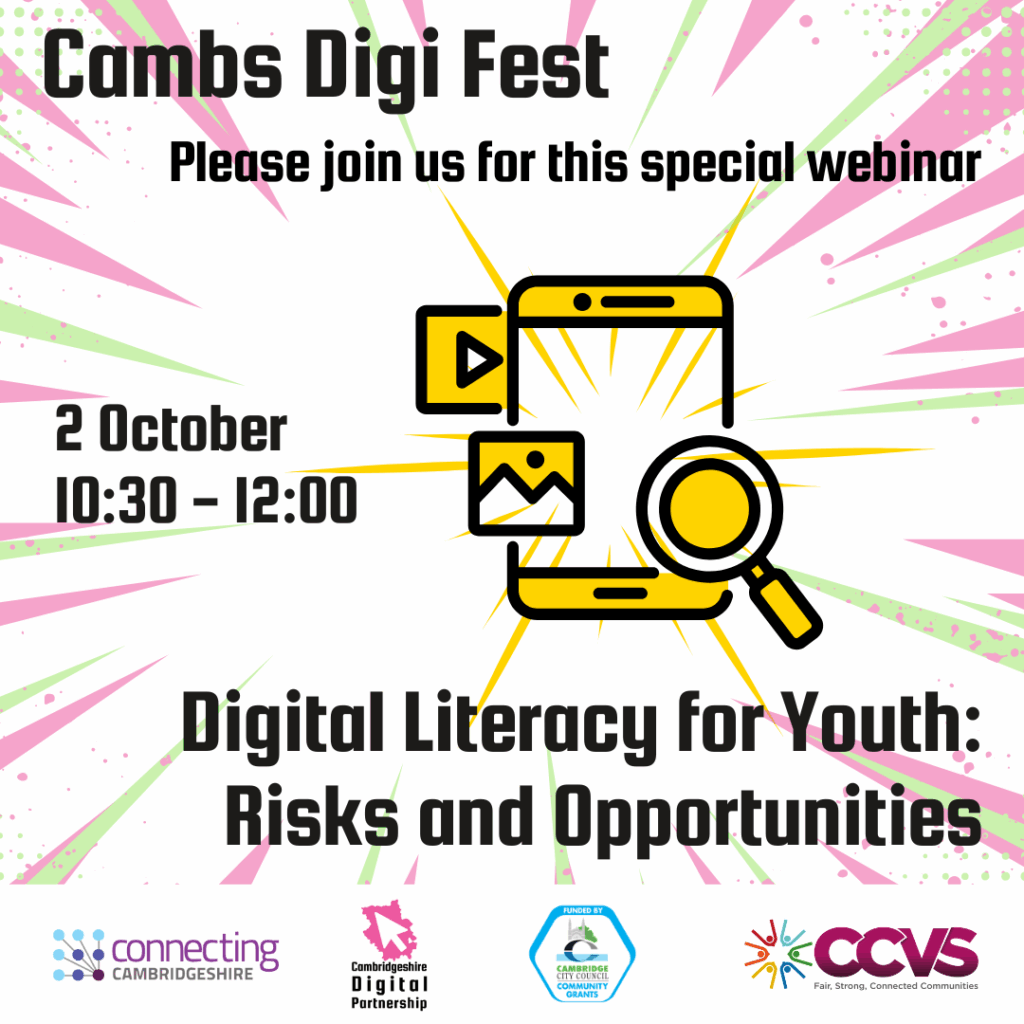Digital Literacy for Youth: Risks and Opportunities

The Cambridgeshire Digital Partnership and Connecting Cambridgeshire presented this special webinar as part of Cambs Digi Fest 2025. Thank you to everyone who attended.
In today’s increasingly digital world, young people need more than just access to technology—they need the skills, understanding, and support to use it safely and effectively. This webinar explored why digital literacy is essential for youth wellbeing, safety, and opportunity, and what role small charities can play in supporting this.
A special thank you to our wonderful guest speakers:
- Ellen Smith, NSPCC local campaigns manager for the East of England.
- Phoebe Moriarty Roberts, Assistant Education Manager at Childnet International.
- Eva Lindy Woods, Skills Policy Officer at Cambridgeshire & Peterborough Combined Authority.
Please find the recording of the presentations below, captions are available on YouTube.
Notes
Ellen Smith, Local Campaigns Manager for the East of England at the NSPCC, began the session by outlining the charity’s mission to protect children and prevent abuse. She described the NSPCC’s wide-ranging work, which includes therapeutic support for children and families, safeguarding training for professionals, and national campaigning to influence legislation. Recent efforts include contributions to the Online Safety Act and a campaign advocating for equal protection against physical abuse.
Ellen introduced the concept of digital literacy using a definition from Common Sense Media, a partner in NSPCC’s school-based safeguarding workshops. She explained that digital literacy is a subset of media literacy and involves the ability to find, evaluate, and use digital information responsibly. It encompasses both technical skills and ethical awareness, such as evaluating sources, protecting privacy, and understanding the long-term impact of one’s digital footprint.
The presentation explored the risks children face online, including cyberbullying, exposure to harmful content, and oversharing personal information. Ellen emphasised the importance of teaching children to use privacy settings, create strong passwords, and respect others’ privacy. She also discussed the need for children to understand the permanence of their digital actions and to be responsible digital citizens.
Ellen shared details of the NSPCC’s online safety campaigns, which aim to balance the celebration of digital benefits with awareness of potential risks. She introduced a free, pre-recorded online safety workshop for parents and carers, designed to encourage early and ongoing conversations about children’s online activity. The workshop promotes a “curious not furious” approach to digital parenting, fostering open dialogue and trust.
A key resource highlighted was “Report Remove”, a tool developed in partnership with the Internet Watch Foundation and police. It allows under-18s to confidentially report and remove inappropriate images shared online. Ellen explained how children can access the service via Childline, and noted a growing number of boys using the tool after experiencing pressure to share images. The emotional impact of such incidents was also discussed.
Phoebe from Childnet followed with an overview of their work in online safety education. Childnet delivers sessions in schools across the UK and internationally, and incorporates youth voice through its advisory board. Phoebe introduced the theme for Safer Internet Day 2026: “Smart Tech, Safe Choices”, which focuses on the safe and responsible use of AI. She shared findings from focus groups, noting misconceptions among younger children and concerns about parents’ understanding of AI.
Phoebe described the structure of Childnet’s upcoming educational packs, tailored for different age groups and designed to be adaptable for learners with special educational needs. Activities range from exploring voice assistants for younger children to evaluating ethical concerns around AI for older teens. Resources for parents and carers include conversation starters, cheat sheets, and handouts to support engagement with online safety.
Childnet’s advice to parents centres on starting conversations, supporting children, and knowing how to respond when things go wrong. Phoebe highlighted tools like the Family Agreement and platforms such as Common Sense Media and Internet Matters for app and game reviews. She encouraged parents to explore these resources with their children and to report concerns using services like CEOP and the Internet Watch Foundation.
Eva Lindy Woods, Skills Policy Officer at CPCA, discussed digital youth work, emphasising its role in reaching young people where they are—online. They introduced the National Youth Agency’s digital youth work standards and described initiatives like the “Your Next Steps” platform, which connects young people to resources on employment, mental health, and local services. The speaker also highlighted the importance of digital inclusion and the risks of assuming all young people have equal access or skills.
The session concluded with a discussion on the role of influencers in shaping young people’s digital experiences. Simon Squibb was cited as a positive example, using his platform to inspire youth entrepreneurship. Eva cautioned against digital opportunities replacing real-world ones and stressed the importance of combining online tools with traditional youth work. Eva acknowledged challenges such as digital exclusion, algorithmic bias, and the pressure to constantly self-improve online.
Thank you again to all.
To keep up to date with our news please sign up to our newsletter: Subscribe to CDP Network